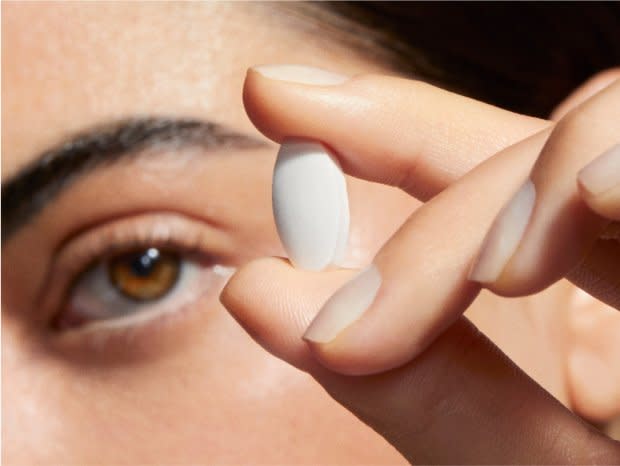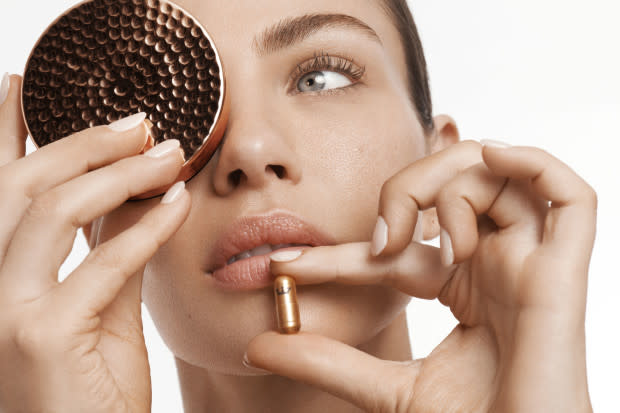Can You Really Get Good Skin by Popping a Pill?
Good skin in a pill is an alluring prospect, and it's one more people are investing in lately.
The global women's health and beauty supplements market, valued at $53.4 billion in 2022, is expected to expand at a compound annual growth rate (CAGR) of 5.1% from 2023 to 2030. "More consumers have become concerned about their health and well-being, and beauty consumers are putting as much focus on what they put in their bodies as on it," Sienna Piccioni, trend forecaster and head of beauty at WGSN, tells Fashionista, adding that "the lack of access to medical professionals during the pandemic really put this front and center."
As we live our lives at full speed once again, the lure of a quick fix has never been stronger. "People are looking for smart beauty hacks and zero-effort solutions that can work in the background, freeing up more time for themselves. Ingesting a collagen-boosting supplement instead of performing a drawn-out 10-step skin-care routine will seem like a no-brainer for some," says Piccioni.
Supplements for skin tend to fall into two categories: those that contain ingredients that occur naturally in human bodies — the most obvious examples being collagen-, ceramide- and hyaluronic acid-based formulas — and those that offer supplemental nutritional ingredients which claim to improve skin health or conditions.
The Nue Co.'s Skin Hydrator is a good example of the former. One of the leading brands in the ingestible wellness and beauty space, its 'ingestible moisturizer' contains a mix of collagen, ceramides and hyaluronic acid with the aim of creating visibly plumper, dewier and more hydrated skin. An example of the second category comes from French supplement brand Aime, which has gained traction on social media for its acne-targeting Pure Glow supplement that features a blend of zinc, turmeric and probiotics to "calm" skin and "naturally fight imperfections."
And then there's the crop of scientist-backed, research-driven brands relying on buzzy ingredients that supposedly work at a cellular level to "regenerate" skin (see: Aramore's NAD+ Complex and Timeline Nutrition's Mitopure formulas).
What's consistent across all of the brands is a clever use of consumer-enticing marketing gimmicks, whether a reliance on complex scientific language (as seen in The Nue Co., Aramore and Timeline) or tapping into French heritage to sell notions of a relaxed European lifestyle that leads to a healthy glow (Aime).
Increasingly, these brands are also offering both ingestible and topical solutions designed to be used in tandem — and for many consumers, it seems logical to "nourish" the skin simultaneously from the inside and the out.
But experts caution that, as with many marketing claims, it's important to view the lofty promises of skin-care supplements through a skeptical lens.

Photo: Courtesy of Aramore
Dr. Amy Wechsler, a double-board certified dermatologist and psychiatrist based in New York City, isn't sold: "I think it's hope in a bottle. I haven't seen any studies that really show evidence that the current formulas out there help the skin," she says. The key concern she has with skin supplements that contain ingredients like collagen is how much of the ingredient is actually going to make its way to the skin after being absorbed via the digestive system.
Hard evidence and scientific proof of efficacy is complicated, especially since the majority of research on ingestible skin-care ingredients is being funded and/or carried out by brands themselves, who have vested interest in positive outcomes. And even within independent medical research, there's debate around what constitutes "proof" that something works. Generally, the more independent and peer-reviewed research is, the better; but other elements, like broadening the number of participants in trials and preventing biases via double-blind and randomized controls, can also help.
The supplement category is even more complicated because in most countries, including the U.S., supplements are regulated like food, which means they are assessed for safety — but not efficacy. The FDA is responsible for determining whether or not products are safe for consumption, and there is huge discourse about whether or not they go far enough.
This is a topic about which Lucy Goff, founder of luxury skin-care and supplement brand Lyma, is passionate. She believes we need a system similar to sun care (the UVB number and UVA star rating) that identifies how effective a product actually is.
Lyma's preventive health supplement contains 10 patented and peer-reviewed ingredients and cites skin benefits due to the inclusion of a hydrolized (or broken-up) form of keratin, the protein that helps form hair, nails and skin's outer layer.
Even if an ingredient is "proven" to be effective, it's worth considering how much of it is actually present in a formula, notes Goff. "If you don't dose it correctly, it's like taking half a paracetamol and wondering why it doesn't get rid of your headache. The whole purpose of proving a dose is proving the amount that works," she explains.

Photo: Courtesy of Lyma
Goff also poses an interesting question: Who is trained in the world of supplements? We might turn to doctors for insight on pharmaceuticals or dietitians and nutritionists for insight on food, but supplements fall somewhere in between. This lack of formal training and specialization on the subject can make deciphering supplement use and efficacy even murkier. "There aren't very many experts in the world who are knowledgeable on supplements and how they work inside the body," notes Goff.

Photo: Courtesy of The Nue Co.
Dr. Thivi Maruthappu, the U.K.'s first dual-qualified dermatologist and nutritionist and author of "SkinFood, The Ultimate Nutritional Guide to Healthy, Happy Skin," is also a little skeptical of skin-care ingestibles. Coming from a nutrition perspective, she argues that the overall diet is the most important.
"Supplements are not a shortcut and will never replace a healthy, nutritious diet," she says. In terms of nutrition for the skin, specifically, she has a handy acronym she uses to advise patients on how to eat for optimal skin health: GLOW, which stands for greens, lean protein, healthy oils and whole grains. Dr. Maruthappu does think some dietary supplements can serve a purpose in addition to a healthy diet, but only for people who are deficient in certain nutrients, and only when they're dosed correctly.
"For example, if you don't eat oily fish, you might be low in Omega 3, which does play a role in skin barrier function," she points out. But, she notes, it's ideal to work with a dietician or nutritionist to address these imbalances rather than just eyeballing it yourself.
But what if you're someone who has taken it upon themself to dabble in the realm of skin-care supplements, and you simply swear you're noticing positive effects? (Team Fashionista has been there — multiple times.) How much do we really need strong scientific evidence if anecdotal success stories are there? Perhaps that's the placebo effect at play — it does have surprising amounts of scientific backing, after all. It could also be that starting a supplement regime inspired an overall health kick that in turn helped to improve skin. Or, it could be that some products do work, and the scientific data simply hasn't caught up yet.
Dr. Maruthappu suggests giving these things a try. "If you see an improvement after three months then keep going, if not, then spend your money elsewhere." Dr. Wechsler is a bit more cautious: "I am not giving up on the category, but my concern is people might invest in supplements over science-backed skin care like UV protection or retinol. I worry people might use collagen supplements and not take care of their skin via sun cream," she says.
In other words, dermatologists are pretty much still begging us to stop looking for quick fixes and focus on what they know to be true: wear the damn sunscreen.
Please note: Occasionally, we use affiliate links on our site. In no way does this affect our editorial decision-making.
Want the latest fashion industry news first? Sign up for our daily newsletter.
